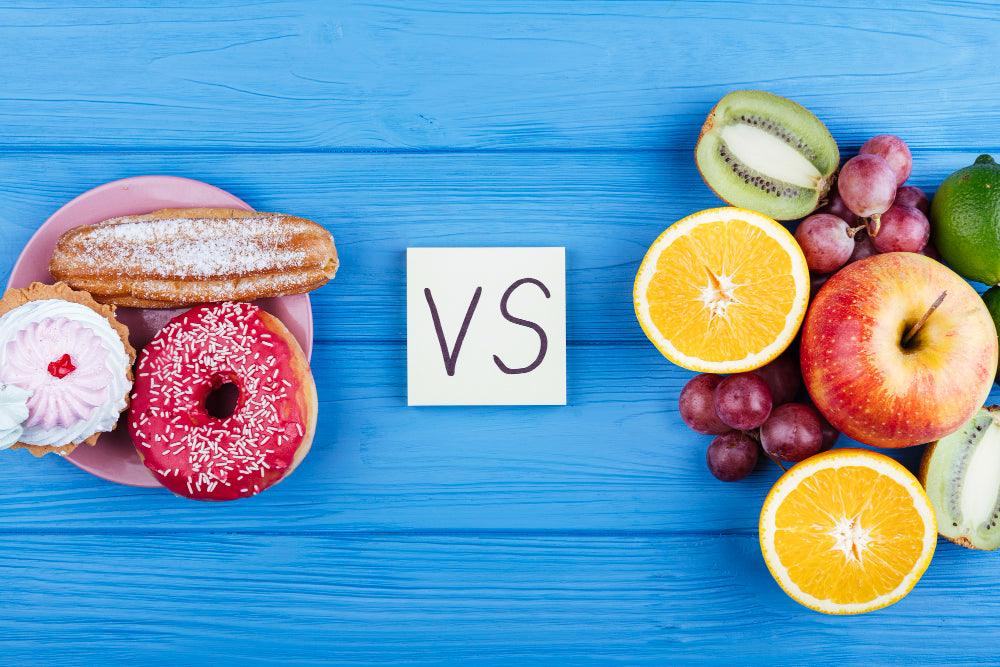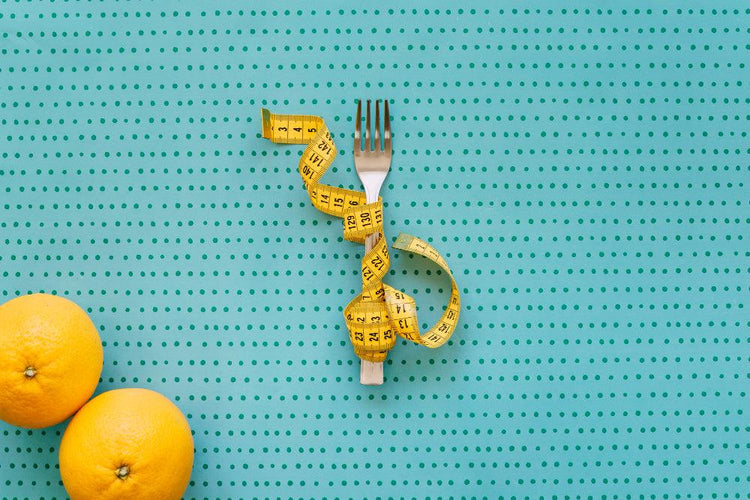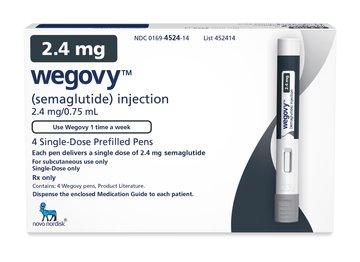Weight loss vs Fat Loss - Whats the Difference?

Related products
What's the Difference between Weight Loss and Fat Loss?
Understanding the difference between weight loss and fat loss is crucial for healthy body management. Weight loss refers to a decrease in overall body weight, while fat loss specifically refers to reducing body fat, explains Dr. Jane Peterson. Don't forget that a holistic strategy is often key for weight loss, involving calorie reduction, maintaining active and healthy lifestyles, and sometimes, if suitable, the inclusion of medical support through products like Wegovy.
Common Confusion between Weight Loss and Fat Loss
The terms 'weight loss' and 'fat loss' are often used interchangeably, causing confusion. Common misunderstanding can lead to unhealthy practices and misconceptions about health and fitness, says Professor Mark Haub.
Importance of Understanding the Differences
It's important to differentiate between weight loss and fat loss as the approach to, and the implications of, both can significantly vary. Understanding these differences can guide more effective strategies for achieving health goals, states Dr. Melina Jampolis, a physician nutrition specialist.
Defining Weight Loss
Weight loss is the decrease in total body weight, defined by NHS. This can result from losing fat, muscle, or water. It's measured using standard scales and is reflected in the Body Mass Index (BMI).
Factors Contributing to Weight Loss: Muscle, Water, and Fat
Weight loss can occur from the loss of different components of body mass. These components include muscle, water, and fat. The proportions of these losses can vary depending on the cause of the weight loss, explains Dr. Donald Hensrud.
When is Weight Loss Healthy and When is it a Concern?
Healthy weight loss involves losing excess body fat, not muscle or water, at a moderate pace. Rapid weight loss, or losing more than 1kg (2.2lbs) per week, can be a concern as it may indicate muscle or water loss, or may lead to nutrient deficiencies, according to Dr. Nick Fuller.
Defining Fat Loss
Fat loss specifically refers to a decrease in the amount of fat stored in the body. Fat plays several important roles in the body, such as providing energy, protecting organs, and maintaining cell function, states Dr. Ian Stephen.
Importance of Body Fat Percentage
The percentage of body fat is an important indicator of health. The NHS suggests that for men, a healthy body fat percentage ranges from 13% to 24%, while for women, it's from 20% to 30%. These ranges can vary depending on age and fitness level.
How can I Measure my Body Fat Percentage at Home?
Measuring body fat percentage at home can be done using body fat scales or handheld devices, as advised by fitness expert Joe Wicks. However, these should only be used as a guide, as they may not be 100% accurate.
Key Differences between Weight Loss and Fat Loss
The key differences between weight loss and fat loss involve how they're measured, what they represent, and their impact on health and fitness.
The Scale Factor: Weight vs Body Composition
While weight loss is reflected in an overall decrease in body weight, fat loss is concerned with body composition - the ratio of fat to lean tissue. Reducing body fat while maintaining or increasing muscle mass is generally healthier and more sustainable, states Dr. Melinda Manore.
Health Implications: Losing Weight vs Losing Fat
From a health perspective, losing excess body fat is usually beneficial as it reduces the risk of conditions like heart disease and type 2 diabetes. On the other hand, losing too much weight, especially if it involves muscle loss, can be detrimental to health, warns Dr. Jane Peterson.
Fitness Implications: Endurance, Strength, and Aesthetics
From a fitness perspective, losing fat can improve endurance, strength, and physical appearance. A lower body fat percentage often results in better athletic performance and a more defined appearance, while maintaining muscle mass is crucial for strength and metabolism, explains Fitness coach Michael Matthews.
Common Misconceptions about Weight Loss and Fat Loss
Misconceptions about weight loss and fat loss can lead to misunderstandings about body health and unrealistic expectations.
Misleading Nature of the Scale
The scale only provides information on total body weight and doesn't differentiate between muscle, fat, and water weight. Relying solely on the scale can be misleading and may not accurately reflect your progress in terms of fat loss or muscle gain, warns Dr. Samantha Heller, a senior clinical nutritionist.
Misinterpretation of Body Mass Index (BMI)
While BMI can provide a general indication of overall body health, it doesn't distinguish between muscle and fat. An athletic person with a high muscle mass may have a high BMI but a low body fat percentage, indicating good health, says Dr. David Katz.
Role of Water Retention and Dehydration
Water retention and dehydration can significantly impact body weight. These factors can cause temporary weight fluctuations that do not necessarily reflect changes in body fat or muscle mass, clarifies Dr. Kathleen Mullane.
Optimizing for Fat Loss
Optimizing for fat loss involves considering multiple factors, including diet, exercise, sleep, and recovery.
Role of Diet in Fat Loss
A balanced diet that maintains a calorie deficit while providing essential nutrients is key for fat loss. Focusing on high-quality proteins, complex carbohydrates, and healthy fats can support fat loss, says Dr. Mike Roussell.
Role of Exercise in Fat Loss: Strength Training vs Cardio
Both strength training and cardio play important roles in fat loss. Strength training helps build muscle mass, which can increase metabolism and promote fat loss, explains fitness coach Michael Matthews. Cardio, especially high-intensity interval training, can also significantly contribute to fat loss.
Importance of Sleep and Recovery
Adequate sleep and recovery are crucial for fat loss, as they help regulate hormones that control appetite and fat storage, says Dr. Matthew Walker, a sleep scientist.
Why Should I Focus on Fat Loss Instead of Weight Loss?
Focusing on fat loss rather than just weight loss can lead to improved health and body composition. Reducing body fat while maintaining muscle mass is more beneficial for overall health and metabolic function, highlights Dr. Donald Hensrud.
What is a Healthy Body Fat Percentage?
A healthy body fat percentage ranges from 13% to 24% for men and from 20% to 30% for women. These ranges can vary depending on age and fitness level, according to the NHS.
How Does Strength Training Contribute to Fat Loss?
Strength training contributes to fat loss by building muscle, which can boost metabolism and increase calorie expenditure, says fitness expert Joe Wicks.
Can You Lose Fat and Gain Muscle at the Same Time?
It's possible to lose fat and gain muscle simultaneously, a process known as body recomposition. This can be achieved through a combination of strength training, protein-rich diet, and adequate rest, suggests Nutrition consultant Dr. Mike Roussell.
Why Doesn't My Scale Show the Right Results for My Fat Loss Efforts?
The scale might not reflect fat loss efforts accurately because it measures overall body weight, not just fat. Using other indicators of progress, such as body measurements and how clothes fit, along with scale readings, advises Dr. Samantha Heller.
Safely Achieving Weight Loss
Safely achieving weight loss requires a balanced approach that considers various factors, including healthy weight loss rate, balance of calorie intake and expenditure, and medical supervision.
Healthy Weight Loss Rate
A healthy weight loss rate is typically around 0.5 to 1kg (1 to 2lbs) per week, according to the NHS. Losing weight too quickly can lead to muscle loss and nutritional deficiencies.
Balancing Calorie Intake and Expenditure
Balancing calorie intake and expenditure is fundamental to weight loss. The importance of creating a sustainable calorie deficit, which means consuming fewer calories than the body burns, without extreme dieting or over-exercising, highlights Dr. Nick Fuller.
Importance of Medical Supervision during Weight Loss
Medical supervision during weight loss is crucial, especially for people with pre-existing health conditions. A healthcare professional can provide personalized advice, monitor progress, and manage potential risks, suggests Dr. Jane Peterson.
How Does Water Retention Affect My Weight?
Water retention can cause temporary weight fluctuations that do not reflect true fat loss or gain. The importance of considering water retention when interpreting scale readings, emphasizes Dr. Kathleen Mullane.
How Does Muscle Contribute to Body Weight?
Muscle contributes significantly to body weight because it is denser than fat. Gaining muscle can even lead to weight gain, even as body fat decreases, explains Fitness coach Michael Matthews.
Why am I Losing Weight but Not Fat?
Losing weight but not fat could mean you're losing water or muscle mass instead of fat. Seek medical advice if you're losing weight without a decrease in body fat percentage, advises Dr. Donald Hensrud.
Conclusion
Understanding the differences between weight loss and fat loss is crucial for setting realistic health goals and creating effective strategies. As explained by our various experts, focusing on fat loss rather than just weight loss can lead to improved health and body composition. It's important to focus on overall health rather than solely on numbers on the scale. As always, consult with a healthcare professional for personalized advice and supervision during your health and fitness journey.









 Rated Excellent by 26,523+ Reviews
Rated Excellent by 26,523+ Reviews